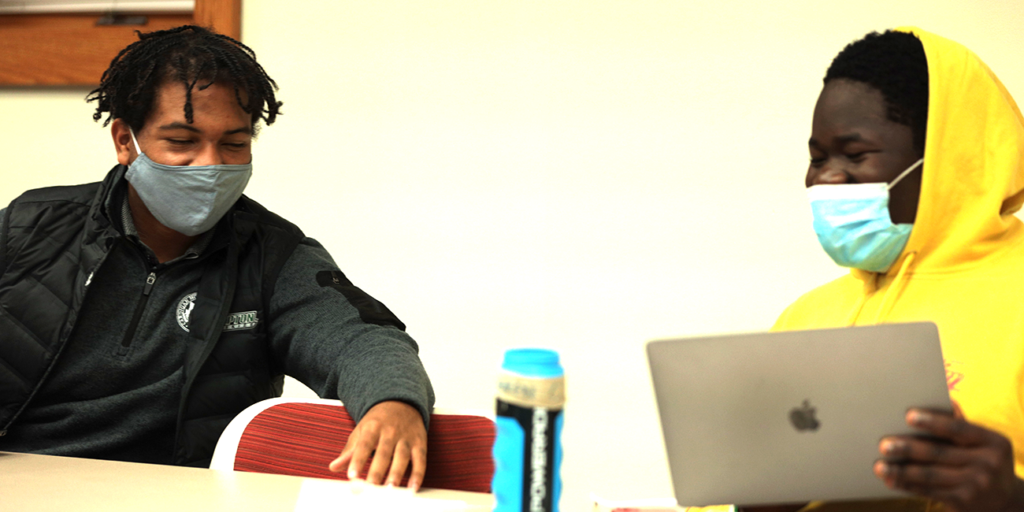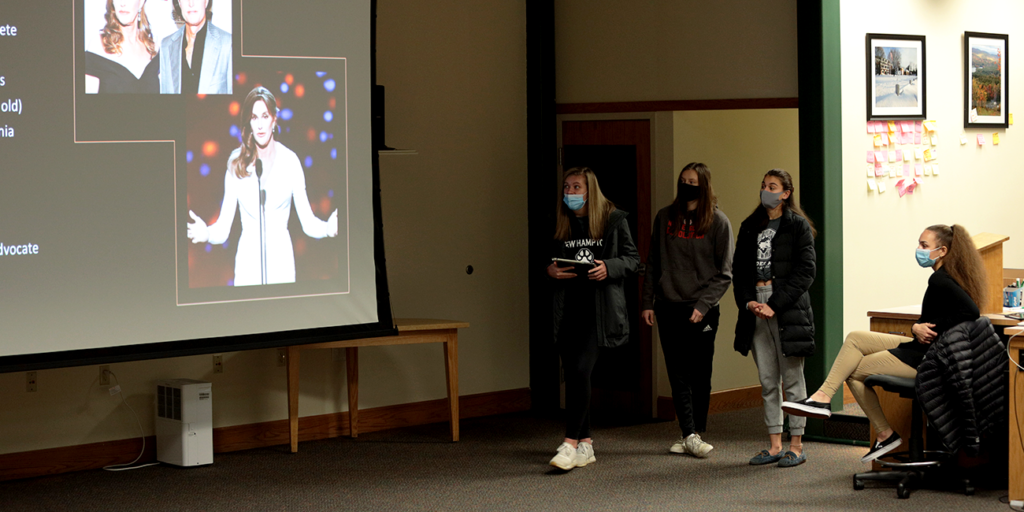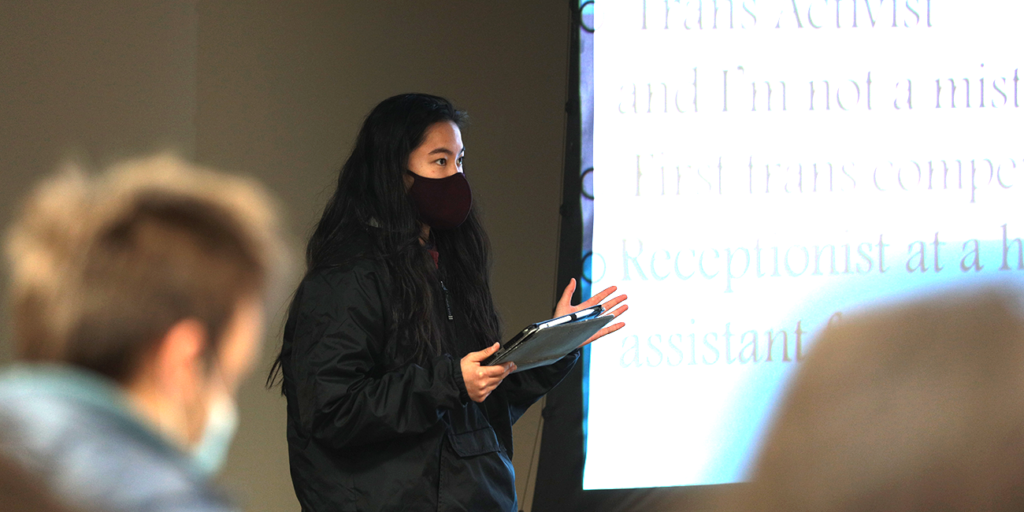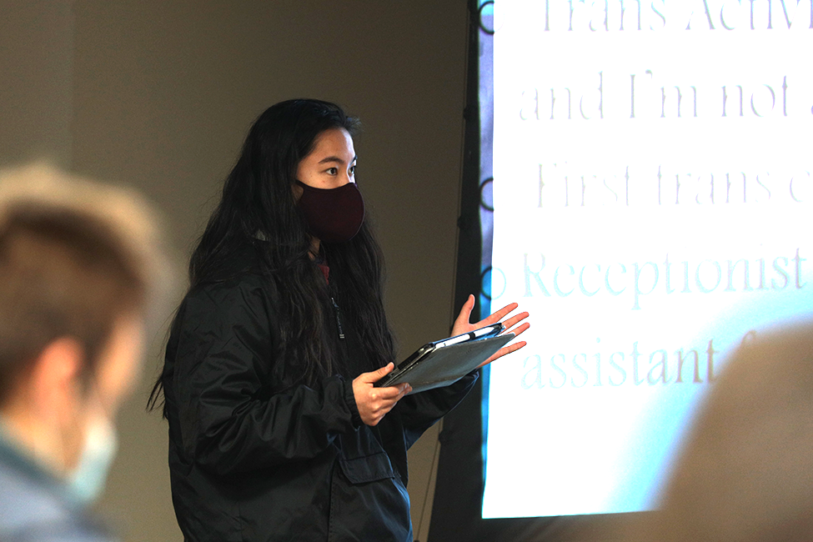The fall semester introduced a new course at New Hampton School, Acknowledging Discrimination, aimed to empower students to recognize and confront discrimination, racism, and sexism. Based on the vision of current student Autumn James ’21, and through the collaborative effort with faculty member Jonathan Schwab, the ideas for this course came to life to directly address the prevalence of discrimination in our world. The popular seminar-style class will return for the second semester to continue its critical mission.

Introducing awareness
Among the poignant topics in Acknowledging Discrimination are: types of discrimination, implicit bias, microaggressions, protests in America, White privilege, the criminal justice system, voting rights, sexism, immigration, LGBTQ+ rights, and more. Any one of these content units could fill many semesters of study, however, the importance lies in the ability to introduce each of them for awareness, discuss their importance, evaluate experiences of one’s own, and listen to different viewpoints. Through varied media and teaching approaches, students were frequently challenged to confront their own ideas safely and discover moments of vulnerability to grow with their classmates.
For the new term, Autumn ’21 will be joined by Donovan Theme ’16, a current faculty member at New Hampton School. Autumn ’21 notes that her first-semester experience in teaching has been very enlightening. “I have learned how much really goes into lesson planning, from researching credible resources, to the delivery methods in the class. Also, I have learned how rewarding teaching is. When I see that everyone in the class is engaged and interested in learning, it makes me feel accomplished and that all my hard work paid off.” Autumn is also is actively visible in the school community, sharing information and opportunities for action. Through learning and growing awareness, students become knowledgeable about active global citizenship, but through action, they become active global citizens themselves.

Student perspectives
While New Hampton School class enrollments are normally kept to approximately 10 students per class, this class offered a larger enrollment number and held the class in the evenings to help achieve greater accessibility to the topic. In total, 29 students enrolled including two remote instruction Thai students who engaged with their classmates (beginning at 5:00 am in their time zone).
The interest in this course was summed up by several students as a desire to educate themselves and others, and finding empowerment in taking a role in the discrimination we see every day. Evan ’21 shared, I wanted to acknowledge discrimination in all forms. Being an African American, I know the prejudices and discrimination forms that come towards African Americans, but I knew I may not understand the experiences of the Asian communities and other minorities.” Sera ’21 also noted, “I wanted to get better at listening and taking in other people’s perspectives. And once took that in, I wanted to be able to address it in other places moving forward.”

Embracing the classwork
Highly praised moments in class are in the discussion time. With a three-hour class each week, this structure allows a flexible time for in-depth conversations, small group work, and projects. Several students particularly enjoyed the movies selected in support of the course, as Lily ’21 says, “The movies have been very fundamental in helping our understanding and they really help you see things on a visual level of what discrimination looks like.” Others noted that the movies covered topics that you wouldn’t necessarily find in current textbooks.
The class also has moments of intentional discomforts, such as learning about how White privilege evolved, and in learning one’s own biases towards a particular race, age, or gender (thanks to an implicit bias test from Harvard University), and confronting those biases.
The class also experienced its rewards in engaging with other students as well as faculty in conversations related to discrimination such as during the “Protest Portraits” art installation by Maundy Mitchell hosted on campus in October. Autumn ’21 explains, “We organized an outdoor reception at the installation to examine the works, and we really wanted the students and faculty to take a deeper look at the meaning and the real message.” Mitchell herself shared in her artist statement: “Shortly after the murder of George Floyd, I decided I wanted to help support the Black Lives Matter movement in some way. I started by watching and listening, trying to educate myself. Then I began this personal portrait project. I welcomed protesters into my studio during protests on the common in Plymouth, NH. I listened to peoples’ stories and shared their portraits.” The opportunity to host and discuss the exhibit which has traveled around New England all summer and fall was met with passion and thoughtfulness among many members of the community.
Moving forward
The second semester begins February 1, and with it, a new group of students will be engaged in Acknowledging Discrimination. Interested students should contact the Academic Office to register.




